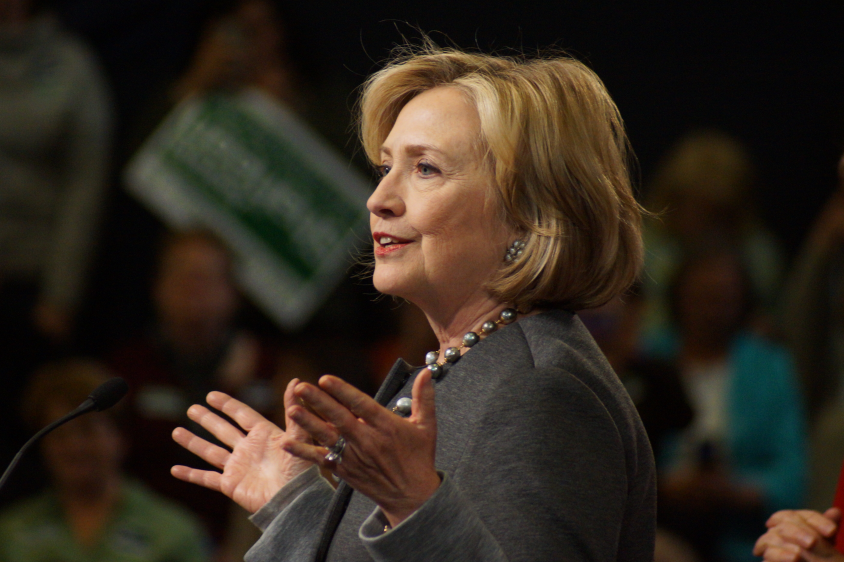Monday night, the presidential race's primary election started In Iowa. The parties must determine candidates for the presidential elections in every state within six months. After Iowa, the same procedure will be held in the states of New Hampshire, Nevada and North Carolina late in February. It will end in mid-June, when the Republicans will hold a final election in North Carolina (Democrats will finish this process a little earlier).
Voting in the first months has a fundamental importance: as a rule, winners are pretty foreseeable towards the end of the race. The tradition to hold first primaries in Iowa stems from 1972 - this state has traditionally been determining mood of voters at the beginning of the first round of the presidential race in the United States.
Advance voting takes place in two forms - caucuses and primaries. The first format requires that the members of the two parties are going in the buildings of educational institutions and other public places, and vote for the candidate openly, through discussion and a show of hands. Primaries also focused on the ordinary voters and are held in the traditional way using the ballot boxes.
This time, the strongest participants in the race were predicated before the primaries. Those from Republican were billionaire Donald Trump and Texas Senator Ted Cruz. The main fighting at the Democrats camp predictably flared up between the former US Secretary of State Hillary Clinton and Senator of Vermont Bernie Sanders.
At that, Democrats could not choose between them. Handling 93% of the vote showed that the preferences of the party’s members split between Hillary Clinton and Bernie Sanders actually equally: 49.8% for Mrs. Clinton against 49.6% for Mr. Sanders. The former head of the US State Department admitted that she was relieved to see results of the vote, even despite failing to get a clear advantage over her main competitor.
The third bidder from the Democrats, former Governor of Maryland Martin O`Malley, managed to score only 0.5%, and has announced his withdrawal from the presidential race.
For the Republicans, the results of the primaries were more univocal. Texas Senator Ted Cruz got ahead of billionaire Donald Trump, having received 27.7% of the vote against Trump’s 24.4%. However, the third candidate’s result - the senator from Florida, Marco Rubio (23.1%) - became a surprise to many. In fact, it made his position even with the leaders of the Iowa race.
source: cnn.com
Voting in the first months has a fundamental importance: as a rule, winners are pretty foreseeable towards the end of the race. The tradition to hold first primaries in Iowa stems from 1972 - this state has traditionally been determining mood of voters at the beginning of the first round of the presidential race in the United States.
Advance voting takes place in two forms - caucuses and primaries. The first format requires that the members of the two parties are going in the buildings of educational institutions and other public places, and vote for the candidate openly, through discussion and a show of hands. Primaries also focused on the ordinary voters and are held in the traditional way using the ballot boxes.
This time, the strongest participants in the race were predicated before the primaries. Those from Republican were billionaire Donald Trump and Texas Senator Ted Cruz. The main fighting at the Democrats camp predictably flared up between the former US Secretary of State Hillary Clinton and Senator of Vermont Bernie Sanders.
At that, Democrats could not choose between them. Handling 93% of the vote showed that the preferences of the party’s members split between Hillary Clinton and Bernie Sanders actually equally: 49.8% for Mrs. Clinton against 49.6% for Mr. Sanders. The former head of the US State Department admitted that she was relieved to see results of the vote, even despite failing to get a clear advantage over her main competitor.
The third bidder from the Democrats, former Governor of Maryland Martin O`Malley, managed to score only 0.5%, and has announced his withdrawal from the presidential race.
For the Republicans, the results of the primaries were more univocal. Texas Senator Ted Cruz got ahead of billionaire Donald Trump, having received 27.7% of the vote against Trump’s 24.4%. However, the third candidate’s result - the senator from Florida, Marco Rubio (23.1%) - became a surprise to many. In fact, it made his position even with the leaders of the Iowa race.
source: cnn.com






